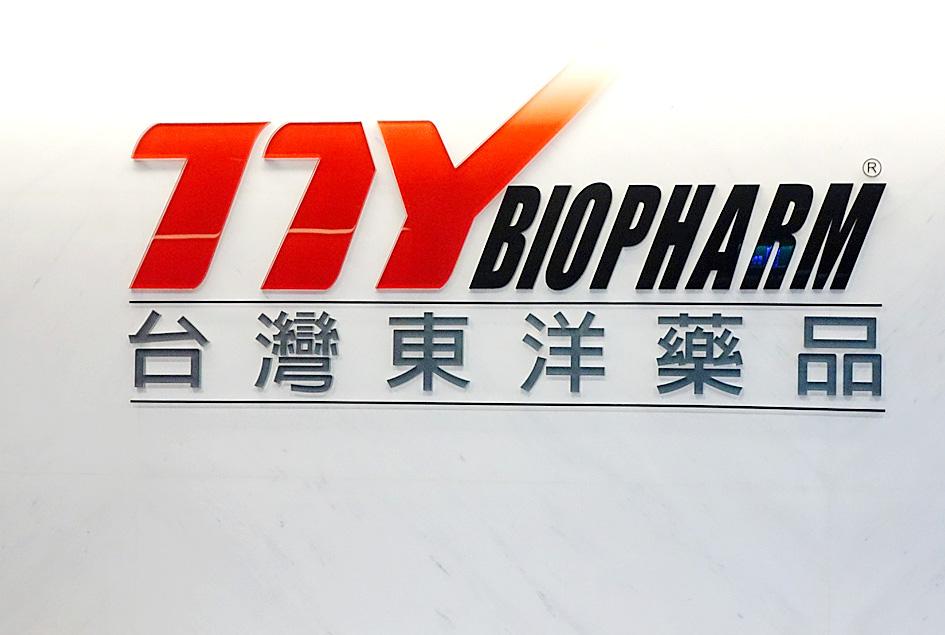The US Food and Drug Administration (FDA) has approved a generic drug developed by Taiwan-based TTY Biopharm Co Ltd (台灣東洋藥品) to treat acute promyelocytic leukemia (APL), the company said on Sunday.
The drug, arsenic trioxide, sold under the brand name Asadin, was first approved for medical use in the US last year, and is listed by the WHO as an essential medicine for treating APL.
APL, a rare form of acute myeloid leukemia (AML), is distinguished by there being too many immature blood-forming cells in the blood and bone marrow, which leads to a shortage of normal white and red blood cells in the body.

Photo: Chang Chia-ming, Taipei Times
It needs to be treated differently from other types of AML, and arsenic trioxide combined with all-trans retinoic acid has become the standard treatment for the cancer.
When APL was first identified in 1957, APL patients had a median survival rate of less than a week, but now 10-year survival rates are plausible thanks to improvements in diagnosis and medication.
TTY Biopharm said in a statement that it hoped the approval of its generic drug could help patients in the US.
The company first received a license to make the drug from the Taiwanese FDA in 2002. It was the first APL treatment license issued in Taiwan.
From 2018, the company developed the drug further under a milestone payment contract with another partner, which it did not identify.
The partner is responsible for the sale, licensing and approval of the TTY Biopharm’s generic drug in international markets, such as Malaysia, the Philippines, Thailand, the US and Vietnam.
The US FDA approval was the first received by TTY Biopharm for any of its drugs, and recognizes the company’s research and development capabilities and manufacturing strength, the company said.
As the materials used to make the drug are highly toxic, the company has partnered with National Central University to create a recycling technique for arsenic ions that makes wastewater from the drug production process safe to release.
In related news, TTY Biopharm’s board of directors yesterday approved the dismissal of general manager Shih Chun-liang (施俊良), after Shih admitted to being involved in an insider-trading scandal involving the company’s shares.
TTY Biopharm chairman Lin Chuan (林全) is also to act as general manager, the company said in a regulatory filing.
Additional reporting by Kao Shih-ching

With an approval rating of just two percent, Peruvian President Dina Boluarte might be the world’s most unpopular leader, according to pollsters. Protests greeted her rise to power 29 months ago, and have marked her entire term — joined by assorted scandals, investigations, controversies and a surge in gang violence. The 63-year-old is the target of a dozen probes, including for her alleged failure to declare gifts of luxury jewels and watches, a scandal inevitably dubbed “Rolexgate.” She is also under the microscope for a two-week undeclared absence for nose surgery — which she insists was medical, not cosmetic — and is

CAUTIOUS RECOVERY: While the manufacturing sector returned to growth amid the US-China trade truce, firms remain wary as uncertainty clouds the outlook, the CIER said The local manufacturing sector returned to expansion last month, as the official purchasing managers’ index (PMI) rose 2.1 points to 51.0, driven by a temporary easing in US-China trade tensions, the Chung-Hua Institution for Economic Research (CIER, 中華經濟研究院) said yesterday. The PMI gauges the health of the manufacturing industry, with readings above 50 indicating expansion and those below 50 signaling contraction. “Firms are not as pessimistic as they were in April, but they remain far from optimistic,” CIER president Lien Hsien-ming (連賢明) said at a news conference. The full impact of US tariff decisions is unlikely to become clear until later this month

GROWING CONCERN: Some senior Trump administration officials opposed the UAE expansion over fears that another TSMC project could jeopardize its US investment Taiwan Semiconductor Manufacturing Co (TSMC, 台積電) is evaluating building an advanced production facility in the United Arab Emirates (UAE) and has discussed the possibility with officials in US President Donald Trump’s administration, people familiar with the matter said, in a potentially major bet on the Middle East that would only come to fruition with Washington’s approval. The company has had multiple meetings in the past few months with US Special Envoy to the Middle East Steve Witkoff and officials from MGX, an influential investment vehicle overseen by the UAE president’s brother, the people said. The conversations are a continuation of talks that

CHIP DUTIES: TSMC said it voiced its concerns to Washington about tariffs, telling the US commerce department that it wants ‘fair treatment’ to protect its competitiveness Taiwan Semiconductor Manufacturing Co (TSMC, 台積電) yesterday reiterated robust business prospects for this year as strong artificial intelligence (AI) chip demand from Nvidia Corp and other customers would absorb the impacts of US tariffs. “The impact of tariffs would be indirect, as the custom tax is the importers’ responsibility, not the exporters,” TSMC chairman and chief executive officer C.C. Wei (魏哲家) said at the chipmaker’s annual shareholders’ meeting in Hsinchu City. TSMC’s business could be affected if people become reluctant to buy electronics due to inflated prices, Wei said. In addition, the chipmaker has voiced its concern to the US Department of Commerce